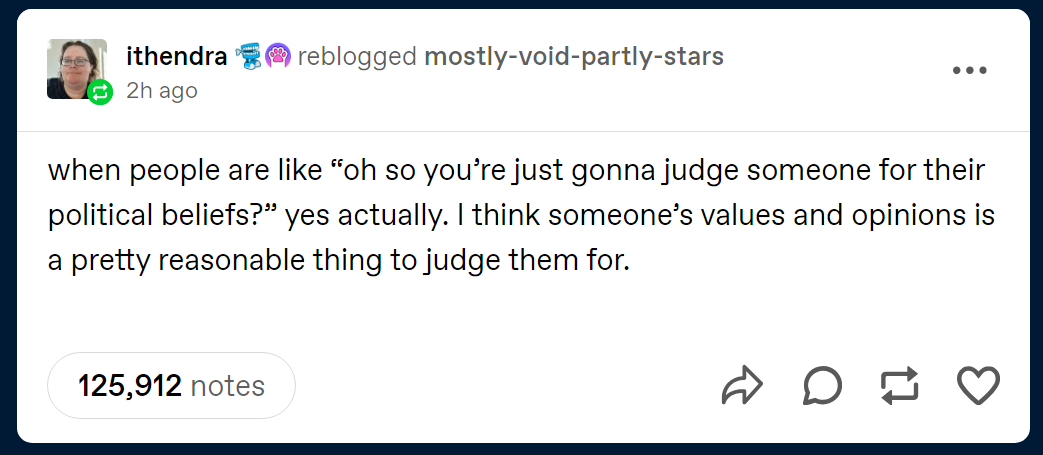this post was submitted on 12 Oct 2024
1057 points (99.0% liked)
tumblr
3497 readers
4 users here now
Welcome to /c/tumblr, a place for all your tumblr screenshots and news.
Our Rules:
-
Keep it civil. We're all people here. Be respectful to one another.
-
No sexism, racism, homophobia, transphobia or any other flavor of bigotry. I should not need to explain this one.
-
Must be tumblr related. This one is kind of a given.
-
Try not to repost anything posted within the past month. Beyond that, go for it. Not everyone is on every site all the time.
-
No unnecessary negativity. Just because you don't like a thing doesn't mean that you need to spend the entire comment section complaining about said thing. Just downvote and move on.
Sister Communities:
-
/c/TenForward@lemmy.world - Star Trek chat, memes and shitposts
-
/c/Memes@lemmy.world - General memes
founded 2 years ago
MODERATORS
you are viewing a single comment's thread
view the rest of the comments
view the rest of the comments

Once upon a time, there were liberals and conservatives whose most significant differences were things like how much of the national budget we should allocate to defence. We've become much more polarized, and now we have a party that openly supports racism, has literally staged a failed coup, has aligned with fascist dictators, and wants to strip the rights from many of our friends and family. Yeah, judging them is the right thing to do.
Yes and no. Even in living memory, the Southern Strategy goes all the way back to the 60s, and explicitly identifies opposition to the civil rights movement as a conservative goal. Going all the way back to the Civil War, it's undeniable how much the economy of the United States is built on slavery — opposing slavery is thus also an economic argument.
Point being, I don't think there was some time in the past where economic policy could be so cleanly separated from racial justice, gender equality, queer rights, disability advocacy, and other things that are now seen as "polarizing." Every economic debate is, I would posit, at least to some significant degree a proxy for a much more critical human rights debate.
Fair point
'You start out in 1954 by saying, “Nigger, nigger, nigger.” By 1968 you can’t say “nigger”—that hurts you, backfires. So you say stuff like, uh, forced busing, states’ rights, and all that stuff, and you’re getting so abstract. Now, you’re talking about cutting taxes, and all these things you’re talking about are totally economic things and a byproduct of them is, blacks get hurt worse than whites.… “We want to cut this,” is much more abstract than even the busing thing, uh, and a hell of a lot more abstract than “Nigger, nigger.” ' - Republican strategist Lee Atwater.
As you say, it's never been possible to cleanly separate economics and social justice, as if there is somehow no moral dimension to how and where we choose to allocate our resources. Sometimes these things are straight up dogwhistles for more overtly prejudiced acts, and sometimes they reflect deeper and more subtle biases about the world. But there is always a moral dimension to everything we do.
Exactly! Damn Democrat Deep State! /s
Fair points all around.